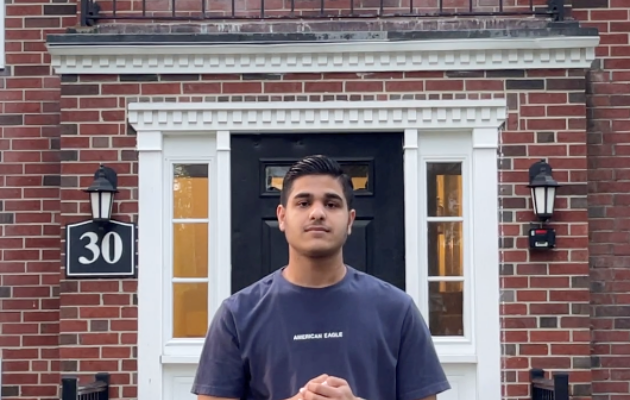
We’re asking students, recent grads, teachers, and counselors five questions on how languages play a role in shaping personal and professional success…
Meet Hasnain—a Massachusetts high school senior and future neurosurgeon. In addition to home languages of Urdu, Pashto, English, and Hindi, he's currently learning French and recently started German.
1. Could you share with us a little about your earliest experiences with languages—when and how did you begin?
I am a second-generation Pakistani immigrant of Pashtun descent. I grew up in a traditional Pakistani household, which allowed me to connect with my culture from a very young age. The first language I started speaking as a toddler was Urdu, Pakistan’s national language. At around four or five years of age, my family started incorporating Pashto, the native language of the Pashtuns who live in northwestern Pakistan, into everyday household life.
Around the same time, my parents began speaking English with me at home because I would soon start going to preschool, and they didn’t want me to have any problems with going to school and not knowing English.
Hindi is the national language of India, and though I’m not from there, it’s nearly the same language as Urdu, with only a few differences. These differences stem from religion, as Pakistan is a Muslim-majority country and India’s population mostly follows Hinduism. Apart from that, I could travel to India, and Hindi speakers would perfectly understand my version of Hindustani.
2. Why French—what first motivated you to choose the language? What have you most enjoyed about learning French so far?
I was first introduced to French at the beginning of sixth grade when the middle school French teacher gave an orientation to my class about learning French. She included some aspects of French culture in her presentation, and I became intrigued enough to do some research on my own. Ultimately, I chose French because of the diverse cultures and people from la francophonie. On top of that, French is en route to becoming the most-spoken language in the near future, so embarking on a journey towards fluency will help me in my practical life.
What I’ve enjoyed most about learning French so far is how it’s connected me closer to my native languages.
Back in French 1, I remember learning fruits and articles of clothing, and I was surprised how similar many of the words were in Urdu and Pashto. For example, “pineapple” in French is ananas, and in Pashto, it’s pronounced the same. Also, “shirt” in French is chemise, and in Urdu, it’s kameez. I never thought that an Indo-Iranian and an Indo-Aryan language would have similarities with a Romance language.
In French 1, I amusingly learned English grammar again because I never really learned what prepositions, object pronouns, and conjunctions were. After tightening these concepts, it became easier to learn more advanced concepts in French, and it also helped me become a better writer in English
3. Have you got a favorite word or expression in another language—what is it, what does it mean, and why is it special?
My favorite French expression is il ne faut rien laisser au hasard, which means “leave nothing to chance.” It basically means to plan ahead, and I find this expression special because of the message it carries. I believe that it’s important to plan for the future and know what’s next on the avenue, however, we shouldn’t get too ahead of ourselves and also focus on the present at the same time.
4. What would you say to a fellow student who is considering enrolling in a language class—any advice?
The best advice I could give is to learn a language only if you want to learn it. To pick anything up, you have to have a love or passion for it. I’ve often seen people choose to learn a world language in school over another solely because of usefulness. Essentially, they decide to learn that language because it would look better for a job or on a college résumé. Though this is important, I believe that there’s more to language learning than just practicality.
When you learn a new language, you open up a different personality, identity, or version of yourself.
As Charlemagne once said, “To speak another language is to have another soul.”
With this idea of “another soul” in mind, I would also suggest staying connected with the language you learn and, importantly, never forgetting it. For me, just the thought of losing one of my languages is extremely saddening because if that ever happened, I would’ve lost a part of who I am.
5. What’s next on your language journey?
The conventional answer would be to say that I want to keep developing my French even after I graduate from high school and that I want to maintain my native languages. However, I’ve come to understand that I’m not orthodox and that my language journey is unique. That keyword—journey. Language-learning, just like life, is not about racing to the finish line but instead enriching yourself as you move slowly and climb each peak.
I’m not exactly sure what’s next on my language journey, but whatever comes along the way, I’m ready for it, and I’ll keep riding the wave as I’ve been doing all these years.
Don’t stress about language learning: Embrace it. For all I know, you’re one lucky individual to have the chance to experience another culture authentically and maybe even discover another version of yourself.
Check out our Connect with French, Connect with Hindi & Urdu, and Language Programs & Funding pages to explore language scholarships, university programs, testimonials, and more! And, as always, visit @LangConnectsFdn on social media to share your story with us.
